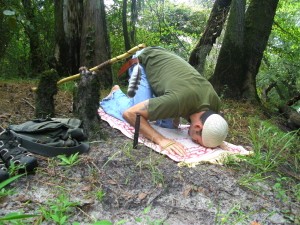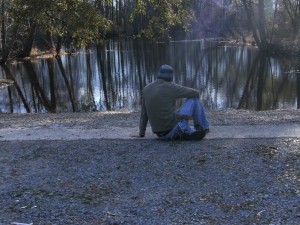In Flann O’Brien’s literary masterpiece, At Swim-Two-Birds, the protagonist is a young writer whose own characters conspire against him in order to determine their own fates. The insurgency falls apart only after the young protagonist, at the end of the novel, completes his college exams.
When I started Project Conversion in January of this year, I wasn’t sure if I’d be able to pull it off. “I’m a fiction writer,” I told a good friend, “I don’t know anything about non-fiction.”
“You are the character now. Write the story,” he said.
He was right. I’ve spent years creating people, places, and situations in my mind and now, I am the protagonist. At first one might think, “That’s so cool! You can make your world whatever you want!” To a degree, yeah, it’s true. But for all you writers out there, you know better, don’t you? Just as the fictional creations of O’Brien’s protagonist secretly conspired against him for control of the story, we are only kidding ourselves if we think we have full control of our own narratives.
From the Sikhi perspective, while we have free will, that ability is set in motion by God’s “Order.” Early in the Japji Sahib, the introductory verses of the Guru Granth Sahib, we are told:
“By God’s Order all forms come into existence, but the working of His Order cannot be described.”
Every writer knows that truth is stranger than fiction and that any good piece of fiction arises organically. Like a garden, we can till the soil, create boundaries, use stakes to guide the stems, but if you want the garden to grow you must allow it to freely move, unhindered.
As a writer and the protagonist of my own story with Project Conversion, I’ve identified the rogue character, the organic element that I never saw coming in the story.
Those of you who’ve been around here for a while know about the river. Originally, it served as my base camp during the ascent toward religious understanding. It was supposed to be neutral ground where I could physically, emotionally, and mentally refresh myself each month. But over the last few months, I’ve had intense experiences there which only increase in potency over time. These experiences stand outside the scope and realm of each faith and thus are something different entirely.
I sense subterfuge. But is it a bad thing? Is this part of “God’s Order?”
Here is what I know–and it’s something I’ve wrestled with for over a week now because as some of you know, I visit the Temple toward the middle of each month, and that’s when the fireworks begin. I don’t think I can go back–not this year. It’s like looking into a dark cave. You have a light, but it only illuminates a small space around you. Eventually, the deeper you go into the cave, your own light is enveloped by the cool dark of the cave and soon, there’s no turning back.
I know that if I go back to the Temple, if I cross the river bridge, there is no coming back.
Why is this important? Because you can’t un-know something. What I’ve gleaned there is disruptive enough. I think about it every day. It keeps me up at night, and it competes with my experience of each faith. One cannot serve two masters.
Since I am the protagonist of my own story, and I understand the elements of story-telling, I’ve now officially rebelled against the narrative. I am resisting the resistance. But who is the writer? Was this–was the river–all “part of the plan,” all part of God’s “Order”? Am I following a natural evolution of thought/development set in motion once the seed for Project Conversion germinated in my mind nearly a year ago?
Someone is allowing this garden to grow, and Project Conversion was the stake, the borders.
In conclusion, I don’t know if my refusal to visit the Temple is actually a rebellion or simply me acting according to some mysterious script. What I do know is that if I go back, the curtain will fall early on this project, because I’ll cease to be who I am today. Life however, tends to find a way. “All the world’s a stage, And all the men and women merely players,” Shakespeare once quibid. The story must go on, whether I like it or not. I’ve had experiences outside of the river, although not as powerful. Will the “author” (natural events, God, fate, etc.) simply make edits to compensate for my actions? Who freaking knows. Just as Guru Nanak saidin the Japji Sahib,
“Everyone is subject to His Order
And no one can defy it.”
Little ol’ me against God’s Order? Gulp. Bring it.




